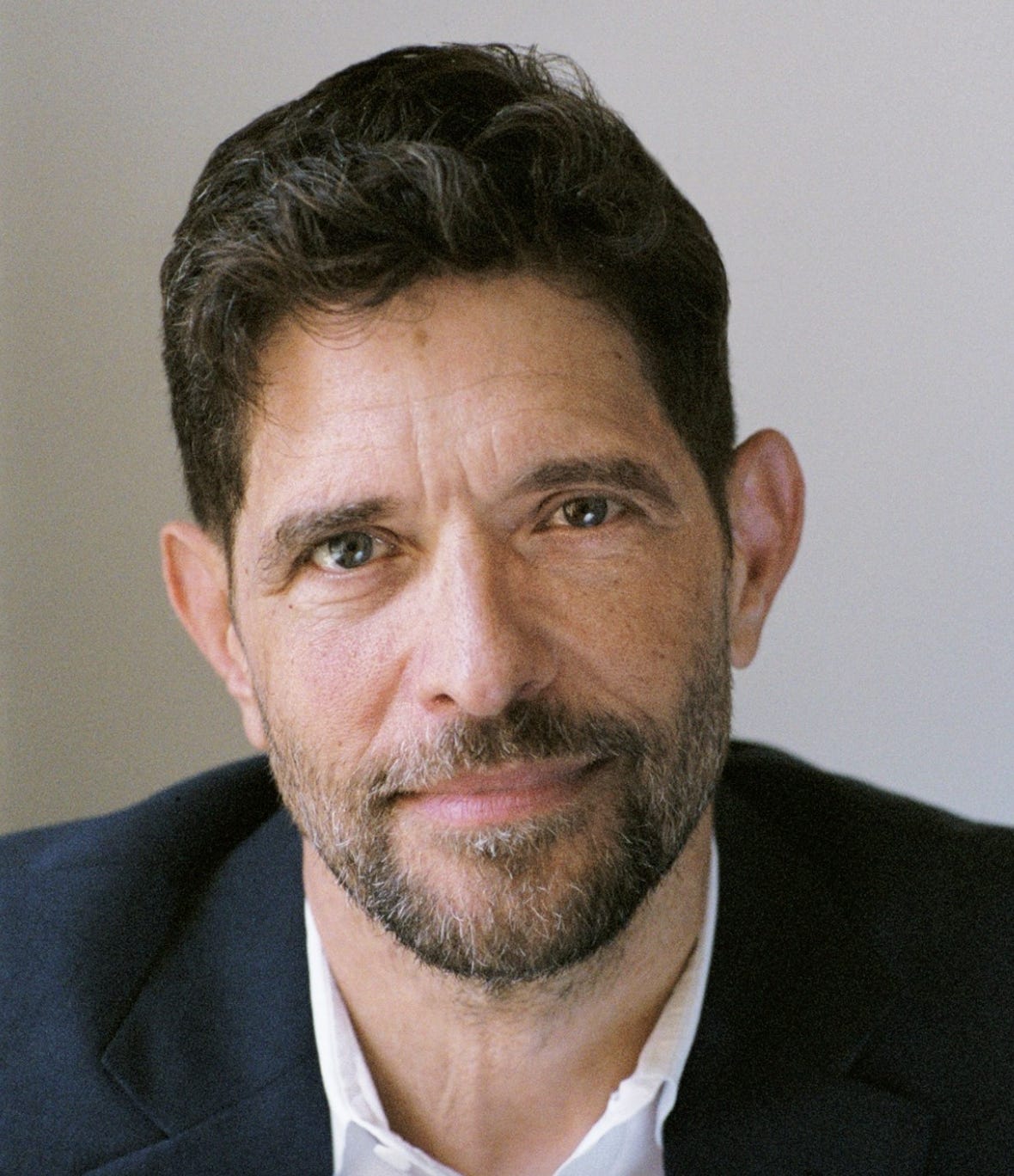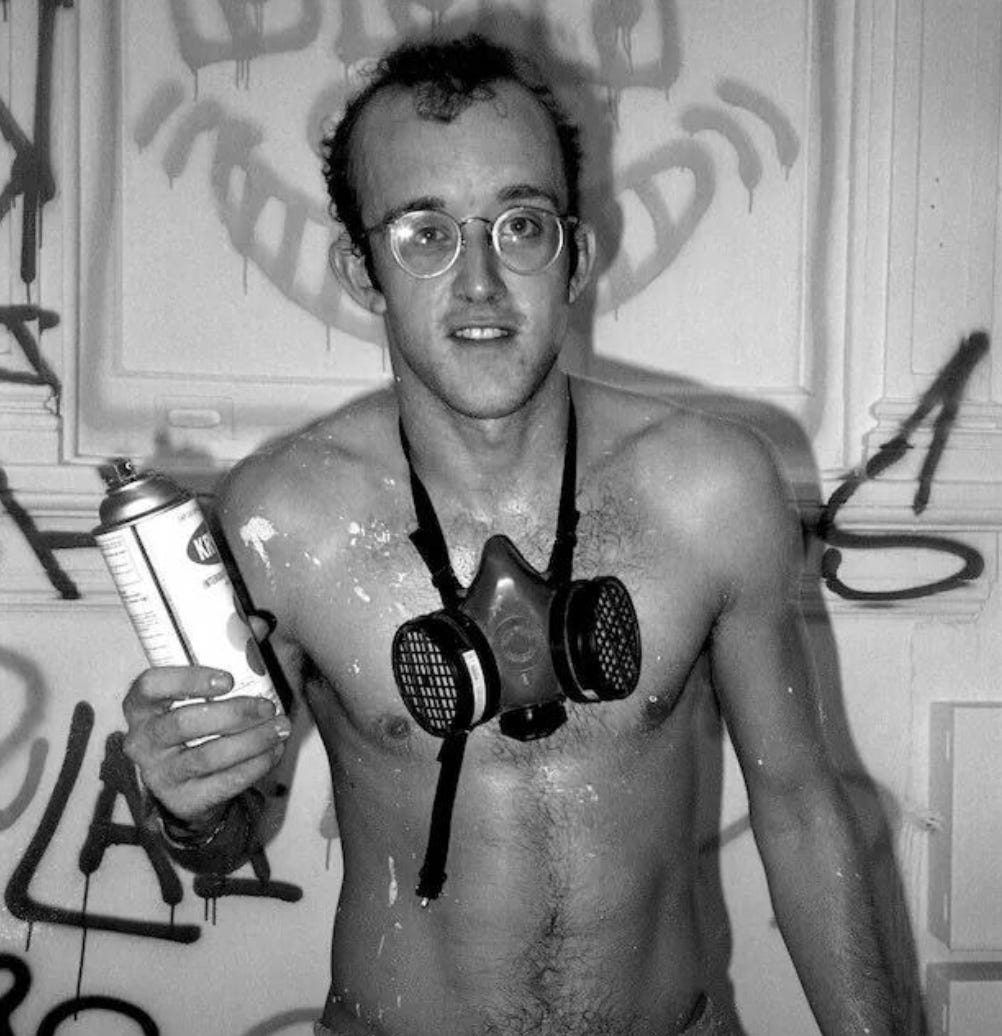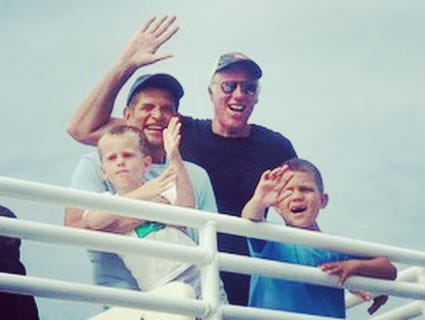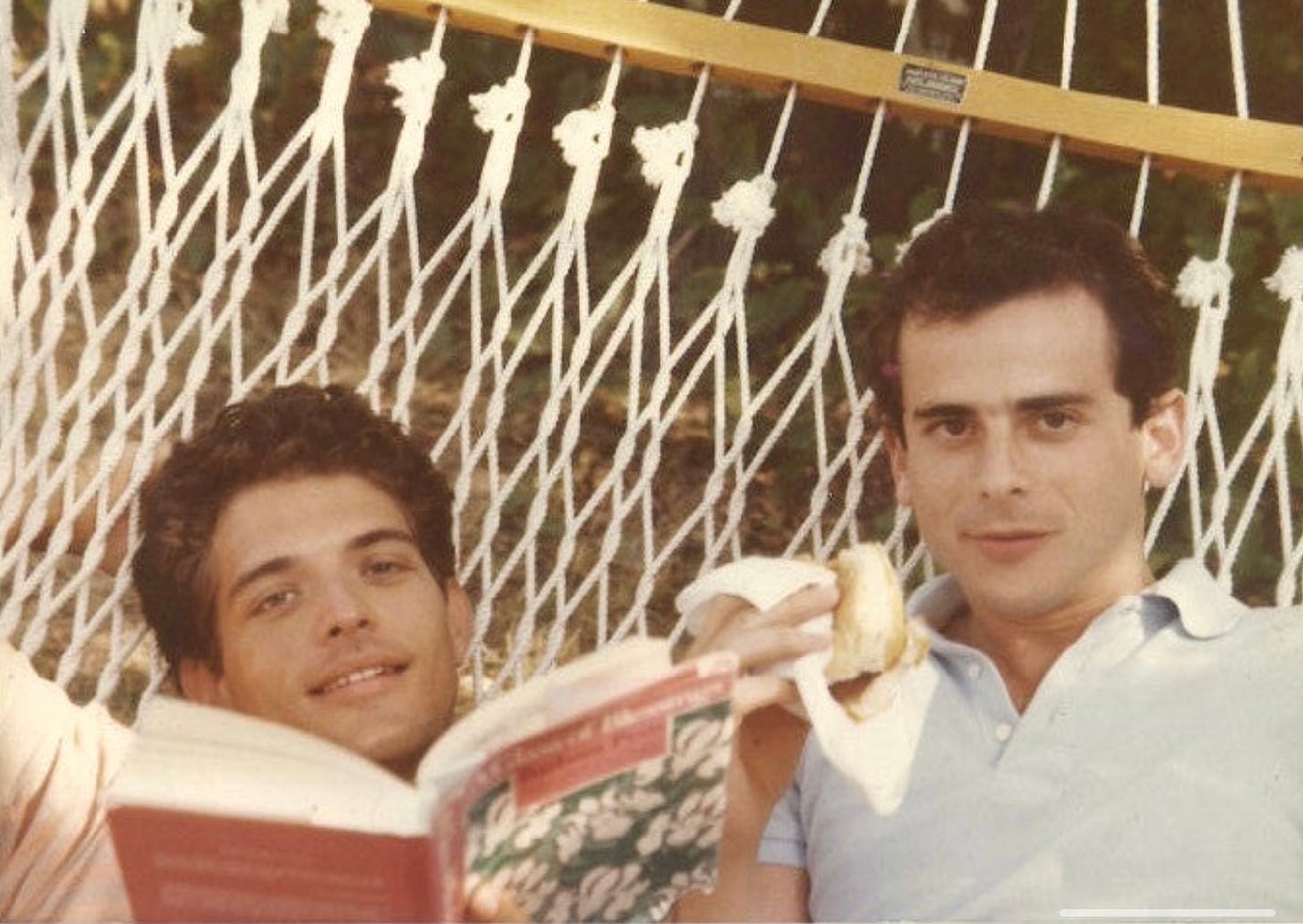Legendary Beauty Brad Gooch On His New Keith Haring Bio and On Fathering Two Little Boys at 72
His Haring biography reconstructs in vivid detail 1980s NYC—a frenetic decade of staggering loss, including of Gooch's own lover.
Hi Caftaners! I write this on March 11, just four days away from being able to intone ghoulishly, “Beware the ides of March!” Personally, I cannot wait to get past not only the ides of March but all of March, and you may as well throw in April too, because I’m sick of NYC’s unrelenting cold rain and gray skies and all I want is to able to go lie in the park under the sun in shorts! But meantime, I have a really great new Caftan interview for you.
But first, I want to shout out two special things. One is that, for my alumni magazine, I recently interviewed a fellow author, Jonathan Corcoran, who has an extraordinary and heartwrenching new memoir out called No Son of Mine, which is about facing rejection after coming out to his poor, evangelical West Virginia family (especially his mother, a singularly heartbreaking character in her own right) even as he was adjusting to the privilege and liberalism of Brown University. It’s a story about our nation’s class divide (I guess you could call it a gay Hillbilly Elegy, except that this particular author isn’t a full-on Trump lackey like J.D. Vance is) and it’s also about the very hard, painful and ultimately soul-nourishing process of creating a supportive and loving chosen family for yourself when your biological family rejects you.
The other thing I want to shout out is a creation of a former Caftan interviewee, Celeste (né James) Lecesne: I’m Feeling Queer Today is a podcast made by, for and about young queer people in which they talk about every aspect of their lives, from how they are depicted in mainstream media to the intersection of queerness and race to conversations with their queer elders. I’ll admit I haven’t listened to it yet, but I will soon! This grew out of The Future Perfect Project (showcasing the voices of young LGBTQ people), which in turn grew out of The Trevor Project, Lecesne’s transformative suicide hotline for young queer people started in 1998 that has grown into so much more since then.
I hope you check out both of those things.
Okay! Have you heard of Brad Gooch? He’s the 1970s-1980s model turned novelist and biographer who has long been voted Most Likely To Have a Picture of Dorian Gray in His Attic because he’s maintained a remarkably youthful beauty well into his early seventies. (He’s now 72.) I mean, look at him here at the age of 63…

He’s also a particularly talented and vivid biographer. In the 1990s, I absolutely loved City Poet, his chunky and juicy biography of Frank O’Hara, in which I learned not only so much about the brilliant and self-hating alcoholic O’Hara himself but the entire world of gay culturatis in NYC in the 1950s and ‘60s—until O’Hara, in a tragic freak accident, was run over by a dune buggy on the beach on Fire Island in the middle of the night the summer of 1966. I haven’t yet read Gooch’s 2009 biography of Flannery O’Connor, but Iwill! (He is also the author of two novels, Scary Kisses and The Golden Age of Promiscuity, and a moving memoir, Smash Cut, about his decade-long relationship with film producer Howard Brookner, who died of AIDS in 1989.)
Gooch’s brand-new bio, Radiant: The Life and Line of Keith Haring, was a must-read for me. I love Haring’s art—even though I don’t think it’s as deeply compelling as Basquiat’s (if we’re comparing downtown NYC 1980s art sensations who died young).
But I really love Haring himself. I love the boyish, wide-eye social energy and intense artistic focus he brought to every second of his short but highly eventful life, I love the geeky sexiness of all those photos of him painting shirtless in short-shorts and those little glasses of his…
…and I particularly love how much he loved New York City, in all its 1970s-80s dereliction, how much he loved New Yorkers from every walk of life, and particularly how much he loved kids. I love how he felt that art was for everyone and how much he loved dance music and ecstatic Saturday nights at The Paradise Garage.
And I thoroughly devoured this biography, which was the deep dive I needed into a life whose broad strokes I knew well but whose granular details had eluded me. And indeed, Radiant is so detailed, with so much archival material and reminiscences from so many survivors of that era, that it plays out almost in real time, month by month from Haring’s arrival in NYC in 1978—well, before that actually, including of course his Pennsylvania childhood, but Haring’s arrival in NYC is when things really heat up—to his death here in 1990. We watch how his increasingly glittery fame grew in almost perfect tandem with the nightmare of AIDS in NYC in the 1980s, a decade in which Haring watched many close to him (including his former lover Juan Dubose) die one after the other, even as he rightly deduced that he himself, based on his voracious sexual appetite at the baths in his first several years in the city, would not be long for this world. And we also watch how his art, which was more stylistically varied than it may appear at first blush, evolved in a very short span of time. I hope Gooch’s bio is optioned for, and then made into, a wonderful film or limited series.
Brad talked a great deal about himself in this interview as well. I asked him bluntly if he worried about having such young children at an unusually advanced age (he is 72; his partner, religious activist Paul Raushenbush, is 59, and their boys are nine and five).
I asked what it’s been like going through his whole adult life as one of gay NYC’s much-spoken-of beauties. And he talked extensively about how living through the worst years of AIDS, and Brookner’s death, shaped him—and misshaped him—in middle age and later life. I think it was a great interview and that Brad was very open and generous with his life story in an unfussy, laid-back way. (He’s been a journalist himself, so perhaps he understands what makes a good interview versus an evasive snooze.) I hope you like it!
And again—annoying, I know!—if you’ve been a happy Caftan reader for a while but haven’t pay-subscribed, please consider it, because it really helps me do this thing. (Securing, preparing for, actually conducting and then editing and formatting even one of these interviews probably takes me about 15 hours a month…the interview alone is usually three hours.)
And I’ll say this once more: If you do pay-subscribe, then a million thank yous!
I’d been hoping to have for next month’s interview the legendary 1970s designer Stephen Burrows, who I’m obsessed with and whom I’ve been trying to get for Caftan for over a year, but I just found out today that he’s a no-go, sadly. I better get cracking finding April’s Caftan interview. Please never hesitate to drop me a line at timmurphyncwriter@gmail.com if you have a suggestion, especially if it’s a gay man “of a certain age” outside of NYC.
And on a final note before the interview with Brad begins, can I just say how much better Feud: Truman Capote vs. The Swans would be if it actually had a plot? It’s a testament to how good the performances (especially, IMHO, Tom Hollander’s and Naomi Watts’) are, and how great the hair, makeup and clothes are that I’m even still watching it!

Tim: Brad, thank you so much for chatting today. I loved the Haring biography. I'm glad I'm familiar with a lot of his work already because I was constantly tempted to go online as I was reading it and look at the works in question you were describing.
Brad: When I was reading a Francis Bacon biography, I was always sitting by the computer looking at the art.
Tim: Yes, that is often how we read these days, isn't it? Googling all the while. Anyway! What is a typical day like for you from top to bottom?
Brad: I have two kids, Walter who is nine and Glenn who is five, so one of them usually wakes me up. Today, I woke up at twenty to seven listening to Walter play chess on this kids' chess app he has with little sound effects. My partner, Paul, is 59 and is a minister who is president and CEO of the Interfaith Alliance, which currently is mainly fighting Christian nationalism. We've been together about 22 years. We met twice—the first at this club that was in the meatpacking district called The Lure.
Tim: Of course! Pork Wednesdays was there! God, I loved that place.
Brad: Right. We exchanged numbers that night but it never happened. Then, five years later, I published a book called God Talk and I'm talking about the book at Barnes & Noble on the Upper East Side and he comes by and thinks, "Oh, he actually is a writer." So he goes and gets in line to talk to me but doesn't buy the book! But anyway, now we live in Chelsea in a two-bedroom apartment, but we bought the studio next door so we're expanding into a three-bedroom.
So then I make French toast for Walter's breakfast and then I make Glenn have peanut butter on whole wheat bread, which takes a while. Then Paul goes to the gym and I take the boys to school a few blocks away and then go to my separate office nearby. I'm here now. I'll be here working until 4pm, then I'll go see my trainer, who I see two times a week, at this gym on 14th Street. Then I'll go home, where the nanny is with the boys, and we all have dinner together, which is about the noblest thing we do as parents. Then I'll probably read The Hardy Boys with Walter. It's the updated version where Frank is shy around girls and Joe is a hound, after girls all the time. So the update is that they're now high-tech and horny.
Then the boys and I will watch some 20-minute video like The Minions and then I put them to bed, then I watch PBS Newshour and read—right now I'm reading the new Streisand memoir—and then I go to sleep.
Tim: I haven't read the Streisand yet. What's it like?
Brad: Very seductive, and I was trying to figure out why. Partly it's that she's such a large, weird, intense personality, but she's self-aware, so she can describe herself pretty accurately going through life. It's like a certain kind of fictional character that you get hooked by. As a writer, she has this fantastic Knaussgardian ability to either remember or make up every detail about her life. She can describe the six different kinds of pastrami sandwiches that she ate growing up. That level of surface detail is really cinematic and absorbing. And she's very detailed about her clothing from age two. She has this thrift shop sensibility and she puts together this look that is entirely her own.
Tim: I wanted to ask you what it's like having kids rather late in life. My brother just had his first kid three years ago at age 47 and he jokes about hoping to making it to her high school graduation. Do you worry— ?
Brad: It's been great for me. I think 60 is a good age to have children. I've discovered that I'm totally available in a way that— I think I would've been a horrible parent in my thirties because I'd have wanted to go out all the time, network, work on my career, or travel. But at this age, parenting is kind of pure enjoyment. I actually enjoy getting down on the floor and playing. I can do that for hours. I'm definitely interested in my kids' imaginations.
Tim: Had you been deeply yearning to have kids?
Brad: No—my partner was. I went along with him and was ambivalent, and also worried about everything like having surrogates [to carry the children]. It seemed like so many things could go wrong. So the surprise was, "Oh, I'm kind of made for this!" The other day, Walter said to me, "Grownups are boring." I agree, kind of. At this point in my life, it's usually more exciting for me hanging out with my kids than going to most events. Not every event, but many.
Tim: Are you ever a bit in awe that you are having this parenting experience so late in life?
Brad: I definitely feel a little bit like Sarah, Abraham's wife in the Bible, who couldn't have kids but then all of a sudden was made fertile by Yahweh and had them. It is kind of startling. At some point, it's going to fall apart.
Tim: You mean like when they're teens?
Brad: I expect, yeah. But at this point, as for the physical part [of parenting], Paul is the one who teaches them skiing and basketball.
Tim: Do you go to a trainer partly to stay in good shape for parenting?
Brad: No. Since the 1970s, my whole erotic life has been based in gyms, so in some ways I don't think at all about why I go to the gym. But I guess I'm aware that it helps to be healthy as long as I can.
Tim: I assume you and Paul have arranged for who would raise the kids in case—
Brad: Yeah, I mean, we have guardians if something happens. Everybody has to have that, no matter what age they have kids. If something happens to us—all that kind of legal, financial and medical stuff—there's a plan.
Tim: Okay, that's good. So let's talk about your childhood. You grew up in a small town in Pennsylvania—just like Keith did! You in Kingston and him in Kutztown.
Brad: Yeah, there were a lot of things about [writing about] Keith that came naturally to me. We were living in NYC at the same time. He was six years younger than me, but both of us were born in the 1950s.
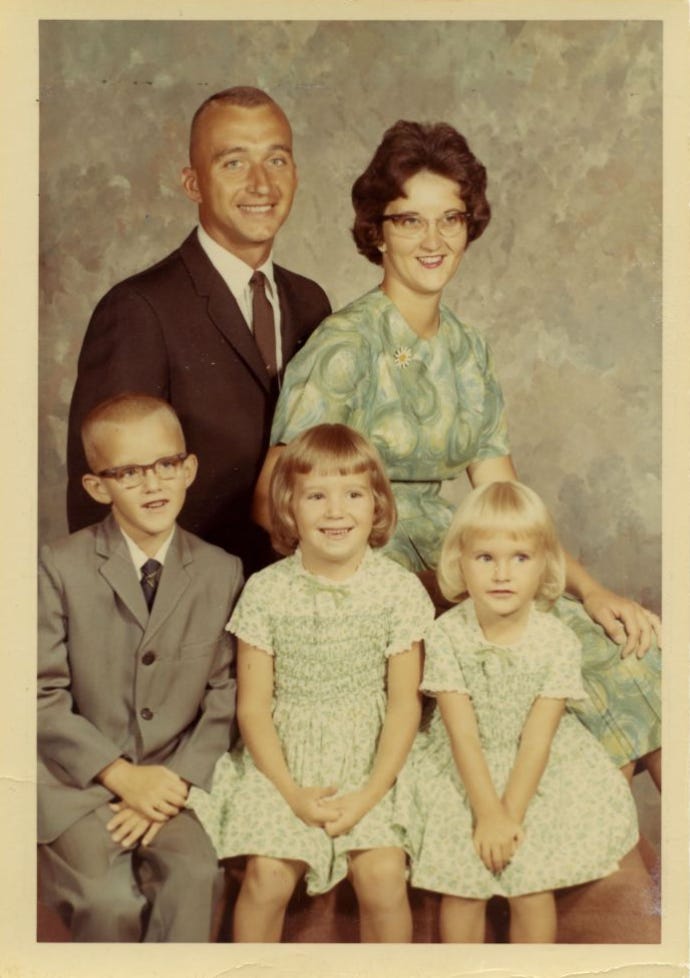
His parents didn't want him to be an artist and my parents didn't want me to be a poet. Both our parents were Republicans. Keith's mother said to me, "Keith never said the word 'gay' or 'AIDS' to us," and I completely understood that kind of dont-ask-don't-tell-ism. I don't think I ever said the word "gay" to my parents, but I'd give them these gay novels I was writing. And just as Keith didn't avoid his family when he had AIDS, when my lover, Howard Brookner [who died of AIDS in 1989] had AIDS, he'd come home with me on holidays with his wheelchair and my parents accepted all of this, but we never discussed, like, "We are lovers, and one of us has AIDS."




